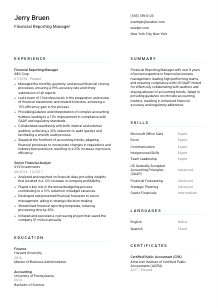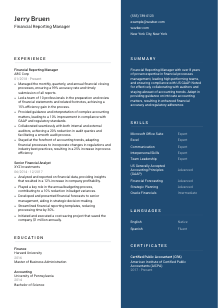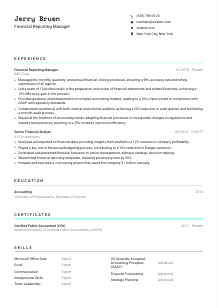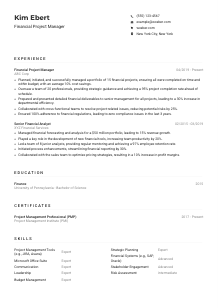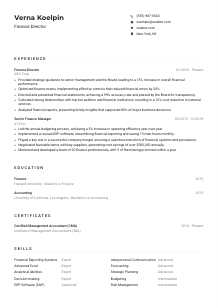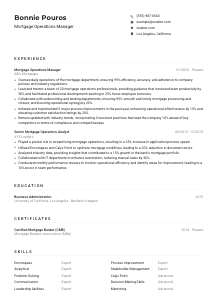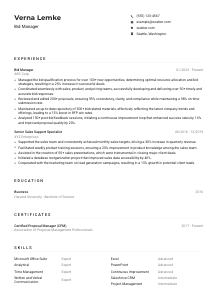Financial Reporting Manager Resume Example
Balancing ledgers, but your resume isn't adding up? Delve into this Financial Reporting Manager resume example, calculated using Wozber free resume builder. Witness how smoothly you can tally your reporting acumen with job expectations, ensuring your career story is as precise as your balance sheets!
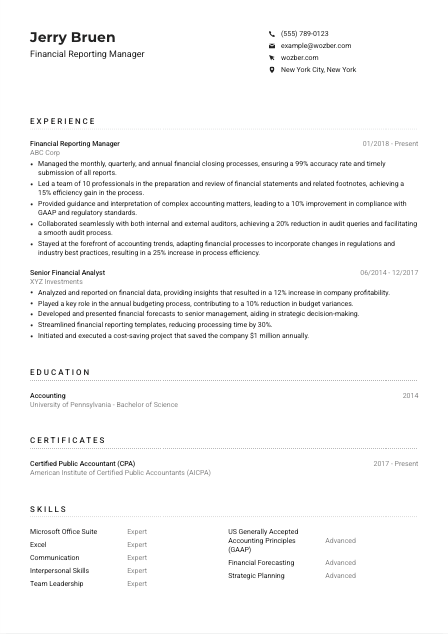
How to write a Financial Reporting Manager Resume?
Hello, aspiring Financial Reporting Manager! Embarking on the journey to secure your dream job requires more than just expertise in balancing sheets—it demands a resume that speaks volumes about your proficiency and readiness for the challenges ahead. With Wozber's free resume builder at your disposal, let's carve a path through the complexities of creating a resume that not only meets the meticulous demands of an ATS but dazzles hiring managers in the financial sector. Dive in as we tailor a resume that's as sharp and accurate as your financial analyses!
Personal Details
First impressions matter. In the world of job applications, your personal details section is the doorway. Let's ensure it's polished and primed for the role of a Financial Reporting Manager.
1. Name Power
You're not just a name; you're the next potential Financial Reporting Manager. Ensure it's boldly and clearly displayed with a professional typeface. This isn't just your introduction—it's your brand.
2. Role Alignment
Place the job title prominently under your name. It immediately signals to the hiring manager that your application is tailored specifically for the Financial Reporting Manager role. This small step sets a tone of intent and professionalism.
3. Critical Contact Info
List your most direct contact number and a professional email. A pro tip? Ensure your email address reflects your professionalism—no outdated nicknames. It's the little details that often make a big difference.
4. Locational Advantage
"Must be located in or willing to relocate to New York City, New York." If you're already in NYC or open to moving, make it known right here. It's a plus in your favor, showing readiness and eliminating any doubts about relocation.
5. Digital Presence
Including a LinkedIn profile or a professional portfolio website can be a game-changer. Just make sure they're scrubbed clean of any unprofessional content and mirror the prowess shown in your resume. In today's digital age, a strong online presence can be your silent advocate.
Takeaway
Your personal details are your first hello to the hiring manager. As the opening act, it needs to be crisp, clear, and reflective of the Financial Reporting Manager you aspire to be. Let it speak volumes about your professionalism and attention to detail. It's your business card; make it count.





Experience
Showcasing your experience is akin to unfolding a compelling story where you're the protagonist steering colossal financial reports to success. Let's ensure your narrative resonates with the essence of the Financial Reporting Manager role.
- Managed the monthly, quarterly, and annual financial closing processes, ensuring a 99% accuracy rate and timely submission of all reports.
- Led a team of 10 professionals in the preparation and review of financial statements and related footnotes, achieving a 15% efficiency gain in the process.
- Provided guidance and interpretation of complex accounting matters, leading to a 10% improvement in compliance with GAAP and regulatory standards.
- Collaborated seamlessly with both internal and external auditors, achieving a 20% reduction in audit queries and facilitating a smooth audit process.
- Stayed at the forefront of accounting trends, adapting financial processes to incorporate changes in regulations and industry best practices, resulting in a 25% increase in process efficiency.
- Analyzed and reported on financial data, providing insights that resulted in a 12% increase in company profitability.
- Played a key role in the annual budgeting process, contributing to a 10% reduction in budget variances.
- Developed and presented financial forecasts to senior management, aiding in strategic decision‑making.
- Streamlined financial reporting templates, reducing processing time by 30%.
- Initiated and executed a cost‑saving project that saved the company $1 million annually.
1. Job Description Analysis
Begin by dissecting the job description. For instance, if it mentions, "Manage the monthly, quarterly, and annual financial closing processes," ensure your experience reflects this skill clearly.
2. Role & Company Structure
List your roles in reverse chronological order, emphasizing footholds that parallel the Financial Reporting Manager position. For each, state your title, the company name, and the tenure, framing a picture of growth and responsibility.
3. Achievement Highlighting
Pinpoint accomplishments that mirror the job's responsibilities. Quantify your successes, such as "Led a team of 10 professionals," to provide a measurable impact of your contributions.
4. Quantify to Qualify
Quantification isn't just for finance; it's for your resume too! Numbers draw the eye and authenticate your achievements. Did you enhance a process by 25% or save the company $1 million annually? These are your headline acts.
5. Relevancy is Key
Every bullet point should directly tie to a requirement or duty of the Financial Reporting Manager role. Extraneous information might dilute your message. Stay on target, and keep your anecdotes pertinent and powerful.
Takeaway
Imagine your experience section as the ledger of your career: every entry must balance and reflect your suitability and zeal for the Financial Reporting Manager role. Present a compelling story of your journey, sprinkled with achievements and numbers that make a hiring manager pause and take note. You're not just detailing your past; you're charting your path forward.
Education
In the stringent world of financial reporting, your educational foundation sets the cornerstone of your credibility. Let's sculpt your education section in a manner that subtly echoes your fitness for the role.
1. Identifying Essentials
The job asks for a "Bachelor's degree in Accounting, Finance, or related field." Make sure your education parallels this requirement unfailingly. It's the threshold you must cross to even play the game.
2. Clarity and Brevity
List your degrees succinctly, ascending from the most recent. Include the degree title, your major, the institution's name, and graduation year. This section, though straightforward, speaks volumes about your preparedness.
3. Matching Degree Titles
"Bachelor of Science in Accounting, Master of Business Administration in Finance." These aren't just degrees; they are your tickets to the interview. Ensure they shine and reflect the job's educational prerequisites exactly.
4. Relevant Coursework
While the broader degree might cover the bases, highlighting specific courses relevant to financial reporting can give you an edge, especially if directly aligned with responsibilities mentioned in the job description.
5. Spotlighting Achievements
Honors, awards, or relevant extracurricular activities can bolster this section. It's not about fluff but about illustrating a trajectory of excellence and dedication. For more experienced candidates, focus more on advanced degrees or certifications.
Takeaway
Your educational background is not just a testament to your knowledge; it's a reflection of a trajectory geared towards excellence in the financial sector. It underlines the foundational skills and ambition propelling your journey to become a Financial Reporting Manager. Let these laurels be confidently displayed, crafting a narrative of preparedness and potential.
Certificates
In the ever-evolving landscape of finance, certificates stand as badges of ongoing learning and specialization. Here, we'll navigate how to shine a spotlight on relevant certifications for the Financial Reporting Manager role.
1. Extracting Job Specs
The job might not explicitly demand certifications, but having a CPA (Certified Public Accountant) is a preferred credential. It's about positioning yourself as a strong contender from the get-go.
2. Selective Showcase
Only bring into the limelight those certificates that reinforce your fit for the Financial Reporting Manager position. It's about quality, not quantity. Your CPA should be front and center, marking you as a finance professional par excellence.
3. Dates Matter
Certifications come with expiration dates. Ensure not only to list your certifications but also to include the date when you earned them. This details your commitment to staying updated in your field.
4. Continuous Learning
In a field that's as dynamic as finance, continual learning is not just advisable; it's essential. Regularly revisiting and renewing your certifications not only keeps you competitive, but it also signals your dedication to professional growth.
Takeaway
Your certifications are your arsenal in affirming your expertise and dedication to the finance realm. Highlight them not just as accomplishments but as evidence of your passionate commitment to your profession. In the financial field, they're not mere accolades but essential tools for career advancement.
Skills
For a Financial Reporting Manager, hard skills speak to your technical ability, while soft skills highlight your leadership and communication prowess. Let's balance this ledger by effectively showcasing the skills that make you the ideal candidate.
1. Decoding Requirements
Starting with the job description, highlight skills such as "Strong knowledge of US GAAP," "proficiency in financial reporting systems," and "excellent communication." Your resume must reflect these competencies clearly.
2. Showcasing Alignment
Detail both hard and soft skills you bring to the table. From mastery in advanced Excel to teamwork and leadership abilities, list them in a way that mirrors the job spec. This is your chance to showcase why there's no one better for the role.
3. Prioritization and Clarity
While it might be tempting to list every skill under the sun, focus on those most relevant to the Financial Reporting Manager role. Distill your skills to the crème de la crème that best showcase your suitability.
Takeaway
Your skills section is more than a checklist; it's a strategically curated showcase of your professional toolkit. Think of it as your resume's balance sheet where assets (skills) are meticulously listed to demonstrate your comprehensive fit for the Financial Reporting Manager role. Make it compelling, make it count.
Languages
In a globalized world, language skills can open doors and bridge gaps, especially in a city as diverse as New York. Let's articulate how linguistic abilities can be a discreet advantage for the Financial Reporting Manager role.
1. Job Spec Relevance
The job demands "English language skills." Ensure this is non-negotiably listed, but also think beyond. In a multicultural hub like New York, additional languages can set you apart.
2. Essential Language Highlight
Start with English, stating your proficiency level. In finance, clear communication is key, and your command of English assures your capability in this global business language.
3. Additional Languages
Following English, list other languages you're proficient in. Whether it's Spanish, Mandarin, or French, additional languages demonstrate your ability to navigate a diverse business landscape.
4. Honest Proficiency
Be truthful about your language levels. From "Native" to "Basic," clarity about your proficiency ensures realistic expectations and showcases honesty—traits valued in any role.
5. Role Scope Consideration
While New York's financial district might not immediately require bilingual abilities, they reflect your preparedness for a global stage. It subtly underscores your adaptability and cultural awareness.
Takeaway
In a world where business is as global as it is local, your language skills are not just about communication; they're about connection. Flaunt them as part of your broader skill set, and let them underline your global business acumen. In a diverse metropolis and in finance, being multilingual is a silently powerful asset.
Summary
Your summary is the high-level executive overview of why you're the standout choice for the Financial Reporting Manager role. Let's craft it to be as compelling and concise as a well-crafted executive summary.
1. Essence of Job Understanding
Immerse yourself in the job description and align your summary to reflect how you meet and exceed those requirements. This is about bridging your professional saga with the role's narrative.
2. A Powerful Introduction
Begin with a strong opening line, establishing your profession and years of experience. "Financial Reporting Manager with over 8 years of proven expertise" sets the stage for your capabilities.
3. Core Skill and Achievement Showcase
List key accomplishments and skills that align with the job's demands. Mention your knack for GAAP compliance, your leadership in financial processes, and your role in efficiency improvements. Specificity is your ally.
4. Keeping It Concise
Though it's tempting to detail every success, the summary should be a teaser that invites the hiring manager to read on. Aim for 3-5 compelling lines that encapsulate your fit for the role.
Takeaway
Think of your summary as the opening argument in your case for why you're the best fit for the Financial Reporting Manager position. It needs to be concise, compelling, and packed with the essence of your experience and achievements. Craft it with the same diligence you'd apply to a financial audit, ensuring every word counts and every sentence resonates. Be bold, be proud, and let your summary set the narrative for the rest of your resume.
Launching Your Financial Reporting Manager Journey
Congratulations! With each section meticulously crafted, your resume is now a beacon, signaling your readiness and eagerness for the Financial Reporting Manager role. It's not just a document; it's a testament to your expertise, dedication, and the unique value you offer. Let Wozber's free resume builder, inclusive of ATS-friendly resume templates and ATS optimization tools, guide you to tailor your resume with precision.
Your next chapter in the finance world is waiting to be written. Go ahead, submit that application, and step confidently into the possibility of tomorrow. Your journey is just beginning, and the ledger of your career is poised for its most significant entry yet.

- Bachelor's degree in Accounting, Finance, or related field.
- Master's degree or CPA designation preferred.
- Minimum of 7 years of relevant experience in financial reporting or related fields.
- Strong knowledge of US Generally Accepted Accounting Principles (GAAP).
- Proficiency in financial reporting systems and Microsoft Office Suite, particularly with advanced Excel skills.
- Excellent communication and interpersonal skills, with the ability to collaborate cross-functionally and lead a team.
- English language skills are mandatory for this position.
- Must be located in or willing to relocate to New York City, New York.
- Manage the monthly, quarterly, and annual financial closing processes, ensuring accuracy and timeliness of all reporting.
- Lead the preparation and review of financial statements and related footnotes.
- Provide guidance and interpretation of complex accounting matters, ensuring compliance with GAAP and regulatory standards.
- Collaborate with internal and external auditors to facilitate annual and interim audits.
- Stay updated on accounting trends, changes in regulations, and industry best practices to ensure financial processes remain current and efficient.





